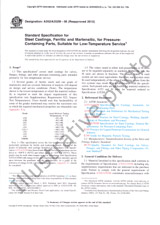We need your consent to use the individual data so that you can see information about your interests, among other things. Click "OK" to give your consent.
ASTM D7553-15(2021)
Standard Test Method for Solubility of Asphalt Materials in N-Propyl Bromide
Translate name
STANDARD published on 15.6.2021
The information about the standard:
Designation standards: ASTM D7553-15(2021)
Publication date standards: 15.6.2021
SKU: NS-1027387
The number of pages: 3
Approximate weight : 9 g (0.02 lbs)
Country: American technical standard
Category: Technical standards ASTM
The category - similar standards:
Annotation of standard text ASTM D7553-15(2021) :
Keywords:
asphalt, n-propyl bromide, solubility,, ICS Number Code 91.100.50 (Binders. Sealing materials),93.080.20 (Road construction materials)
Additional information
| Significance and Use | ||||||||||||||||
|
4.1?This test method is a measure of the solubility of asphalt in n-propyl bromide. The portion that is soluble in n-propyl bromide represents the active cementing constituents. Note 2:?The quality of the results produced by this standard
are dependent on the competence of the personnel performing the
procedure and the capability, calibration, and maintenance of the
equipment used. Agencies that meet the criteria of Specification
D3666 are generally
considered capable of competent and objective testing, sampling,
inspection, etc. Users of this standard are cautioned that
compliance with Specification D3666 alone does not completely ensure
reliable results. Reliable results depend on many factors;
following the suggestions of Specification D3666 or some similar acceptable
guideline provides a means of evaluating and controlling some of
these factors.
|
||||||||||||||||
| 1. Scope | ||||||||||||||||
|
1.1?This test method covers the determination of the degree of solubility in n-propyl bromide of asphalt materials. It is intended to be a replacement for Test Method D2042 specifying a solvent that, like trichloroethylene, is safe in that it has no flash point, and has similar solubilizing characteristics to trichloroethylene, but it is not considered to be an ozone depleter banned by the Kyoto Protocol. Note 1:?This method is not applicable to tars and their
distillation residues or highly cracked petroleum products. For
methods covering tars, pitches, and other highly cracked petroleum
products, and the use of other solvents, see Test Methods
D4, D2318, and D2764.
1.2?The text of this standard references notes and footnotes which provide explanatory material. These notes and footnotes (excluding those in tables and figures) shall not be considered as requirements of the standard. 1.3?The values stated in SI units are to be regarded as standard. No other units of measurement are included in this standard. 1.4?This standard does not purport to address all of the safety concerns, if any, associated with its use. It is the responsibility of the user of this standard to establish appropriate safety, health, and environmental practices and determine the applicability of regulatory limitations prior to use. 1.5?This international standard was developed in accordance with internationally recognized principles on standardization established in the Decision on Principles for the Development of International Standards, Guides and Recommendations issued by the World Trade Organization Technical Barriers to Trade (TBT) Committee. |
||||||||||||||||
| 2. Referenced Documents | ||||||||||||||||
|
We recommend:
Technical standards updating
Do you want to make sure you use only the valid technical standards?
We can offer you a solution which will provide you a monthly overview concerning the updating of standards which you use.
Would you like to know more? Look at this page.




 Cookies
Cookies
